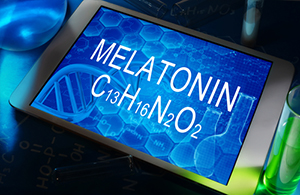 Researchers have long known that sleep and type 2 diabetes are somehow related, as people who maintain poor sleep schedules are at greater risk of diabetes.
Researchers have long known that sleep and type 2 diabetes are somehow related, as people who maintain poor sleep schedules are at greater risk of diabetes.
A new study by Swedish researchers can now help us fill in the gaps.
It all lies in a naturally produced sleep hormone that many people also take as a supplement. And it’s claimed to be completely safe.
Be warned, however: avoid this “safe” sleep aid like the plague if you’re suffering (or at risk of) type 2 diabetes as it will skyrocket your blood sugar level.
The journal Cell Metabolism has just printed an article by a team of Swedish scientists in which they demonstrated how an increase in the sleep hormone melatonin reduces the body’s release of insulin.
The scientists directly tested the effects of melatonin on the pancreatic beta cells of mice.
In the presence of melatonin, pancreatic beta cells are triggered to produce only a little insulin. When melatonin is scarce, they are triggered to produce a lot.
What does this mean?
Type 2 diabetes is caused by low levels of insulin or insulin resistance by your cells.
Our bodies use melatonin to keep our sleep schedules regular. Its release is at its highest during the darkest hours of the night and at its lowest during the brightest daylight hours.
That is why many people use a melatonin supplement at night when they want to go to sleep. They believe that their bodies produce too little melatonin and need more of it to allow them to sleep.
The new study reveals that supplementation with melatonin is a poor choice if you’re at risk of or already suffer type 2 diabetes as it artificially lowers your body’s production of insulin. Which leads to sky-high blood glucose levels.

 Overcoming IBD
Overcoming IBD Multiple Sclerosis
Multiple Sclerosis Banishing Bronchitis
Banishing Bronchitis Gum Disease Gone
Gum Disease Gone Overcoming Onychomycosis
Overcoming Onychomycosis Neuropathy No More
Neuropathy No More The Prostate Protocol
The Prostate Protocol Brain Booster
Brain Booster
 Ironbound
Ironbound
 Solution for Shingles
Solution for Shingles
 The Bone Density Solution
The Bone Density Solution
 The Ultimate Healing Protocol
The Ultimate Healing Protocol
 The Parkinson's Protocol
The Parkinson's Protocol
 The Chronic Kidney Disease Solution
The Chronic Kidney Disease Solution
 Overthrowing Anxiety
Overthrowing Anxiety The Fatty Liver Solution
The Fatty Liver Solution The Hypothyroidism Solution
The Hypothyroidism Solution
 The End of Gout
The End of Gout The Blood Pressure Program
The Blood Pressure Program
 The Oxigized Cholesterol Strategy
The Oxigized Cholesterol Strategy
 Stop Snoring And Sleep Apnea Program
Stop Snoring And Sleep Apnea Program
 The Arthritis Strategy
The Arthritis Strategy The Vertigo & Dizziness Program
The Vertigo & Dizziness Program The 3-Step Diabetes Strategy
The 3-Step Diabetes Strategy Hemorrhoids Healing Protocol
Hemorrhoids Healing Protocol The Erectile Dysfunction Master
The Erectile Dysfunction Master Weight Loss Breeze
Weight Loss Breeze The IBS Program
The IBS Program The Insomnia Program
The Insomnia Program The Migraine and Headache Program
The Migraine and Headache Program The Neck Pain Solution
The Neck Pain Solution The Menopause Solution
The Menopause Solution The Ejaculation Master
The Ejaculation Master The TMJ Solution
The TMJ Solution The Acid Reflux Solution
The Acid Reflux Solution The Fibromyalgia Solution
The Fibromyalgia Solution The Psoriasis Strategy
The Psoriasis Strategy